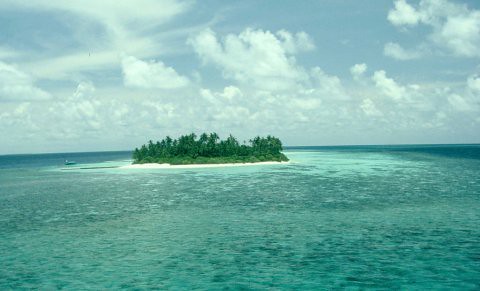
The Maldives, a strand of coral atolls south of India, is just about the most tenuous country on Earth. No patch of land in the island chain, where the population has risen from 200,000 to 400,000 in the last 25 years, is more than six feet or so above sea level. Even modest projections for a rise in sea level from global warming would increase flooding from storm surges. A higher rise could render hundreds of islands uninhabitable.
That’s why the country has paid particularly close attention, since the early days of discussion of the issue, to scientists who warn of a growing human influence on climate and sea levels. On Sunday, the new president of the island nation, Mohamed Nasheed, prodded the world to get serious about cutting emissions of heat-trapping greenhouse gases by pledging, in a short piece in England’s Observer newspaper, to make the Maldives the first carbon-neutral country within a decade:
Many politicians’ response to the looming catastrophe, however, beggars belief. Playing a reckless game of chicken with Mother Nature, they prefer to deny, squabble and procrastinate rather than heed the words of those who know best…. Spearheaded by a switch from oil to 100% renewable energy production within a decade, the Maldives will no longer be a net contributor to greenhouse gas emissions.
The announcement was made in the Maldives, but synchronized with the London premiere of “ The Age of Stupid,” a new film on global warming and oil that is a mix of documentary, dramatization and animation. (I haven’t seen it yet, but the description reminds me of the work of Randy Olson, particularly his mock documentary “ Sizzle.”) Officials in the Maldives made the decision after soliciting a report on how to cut fossil fuel use and otherwise trim the country’s climate footprint from Chris Goodall and Mark Lynas, British environmentalists and authors of books on energy and climate.
The proposal recommended a mix of wind turbines, rooftop photovoltaic panels and a backup power plant that burns coconut husks (coconut is a substantial export), among other steps. The estimated cost: about $1.1 billion over 10 years. But the new energy options could pay off in the long run by greatly reducing the country’s reliance on imported oil, the report concluded.
The early concern about global warming by officials in the Maldives was visible as far back as 1988, as shown in this vignette from my first (and long out of print) book on climate, “Global Warming: Understanding the Forecast”:
Perhaps the most straightforward projections of what a greenhouse future will bring in coming decades are those related to rising seas. A foot-and-a-half rise doesn’t sound like much — unless you live in a place that just barely pokes above the ocean. I learned this when I went to Toronto in 1988 to report on the First International Conference on the Changing Atmosphere. Most of the discussions centered on devising strategies to curb emissions of carbon dioxide and other heat-trapping gases from automobiles, power plants, and the burning of tropical forests. Among those in attendance was Hussein Manikfan, who holds the title Ambassador Extraordinary and Plenipotentiary Permanent Representative to the United Nations from the republic of Maldives.
At first it seemed odd to find a representative from the Maldives at the meeting. The country, a sprinkling of 1,190 coral islets in the Indian Ocean southwest of Sri Lanka, has no tropical forests, hardly any automobiles, and little industry beyond the canning of bonito. I spoke for a while with Manikfan. Why was he in Toronto?“To find out how much longer my country will exist,” was his simple reply.
Manikfan is worried because few of the islands have any point that is more than six feet above sea level. Even now, many of the atolls are awash during strong storms. The fear is that Manikfan’s nation — with a tradition of independence dating back thousands of years and its own language and alphabet — might have to be abandoned altogether, as if it were a slowly sinking ship.
Original here



No comments:
Post a Comment